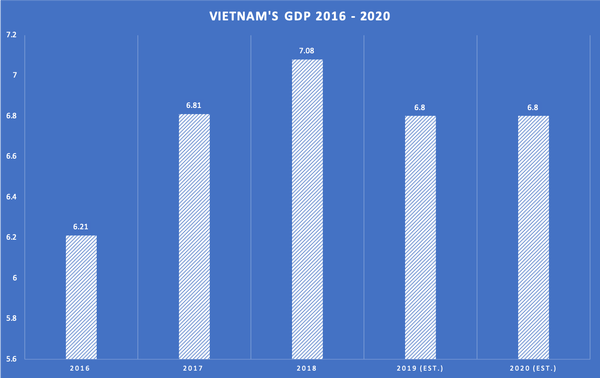Vietnam parliament approves 2020 GDP growth target of 6.8%
The 2020 socio-economic plan stressed the importance of restructuring the economy by revising the growth model, and accelerating the implementation of major projects that serve as driving forces for growth.
The National Assembly on November 11 approved Vietnam’s socio-economic development plan for 2020, including the GDP growth target of 6.8%.
| Data:Government. Chart: Nguyen Tung. |
The plan received endorsement from 426 out of 430 of National Assembly deputies present, representing an approval ratio of 88.2%.
In addition to the GDP growth target, the 2020 socio-economic development plan includes other key economic indicators, such as the consumer price index (CPI) to stay below 4%; export growth of 7%; ratio of trade deficit to total export value below 3%; total social investment capital at 33 – 34% of GDP; a decline by 1 – 1.5% in the poverty rate; unemployment rate in urban areas below 4%, among others.
The overall objective of the socio-economic plan next year is to focus on stabilizing macro-economic conditions; controlling inflation rate; enhancing productivity and national competitiveness.
Moreover, the government is set to continue improving the legal framework to attract more capital for development, and create a transparent, fair and efficient business environment.
The plan stressed the importance on restructuring the economy by revising the growth model, while accelerating the implementation progress of major projects that serve as driving forces for growth.
Vietnam targets to train high quality of human resources in close relation with promoting the development of science, technologies and innovation, eventually leading to sustainable development and higher living standards for the people.
For the year of 2019, Prime Minister Nguyen Xuan Phuc in his report submitted to the National Assembly late in October suggested this would be the second consecutive year that government would achieve and beat 12 key social-economic indicators, including the estimated GDP growth of 6.8%, helping to solidify the macro-economic fundamental and control inflation rate.
International organizations and the world community regarded Vietnam as a spotlight of regional and global economy. The country ranked eighth among the best economies for investors in 2019, up 15 places against 2018.
The World Economic Forum (WEF) assessed Vietnam’s national competitiveness has improved significantly in three major pillars which are institution, infrastructure and skills, ranking 67th out of 141 countries and territories, 10 places higher than that of the previous year.
Additionally, the productivity is expected to expand 5.9%, and the total factor productivity, which is determined by how efficiently and intensely the inputs are utilized in production, could reach 42.7%.
The growth model has been transformed positively, shifting from economic development based on natural resources and credit growth to greater contribution of science, technologies and innovation.
Notably, the manufacturing and processing now is the main driver of growth, while services and agricultural sectors also develop at healthy rates.












